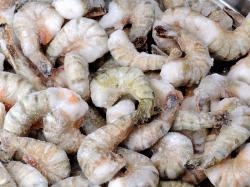It’s Official: Shrimp Is Under SIMP
May 24, 2018 | 3 min to read

As of today, shrimp imports are now officially covered by the U.S. Seafood Import Monitoring Program (SIMP) in accordance with the final rule published in the Federal Register by the National Oceanic and Atmospheric Administration (NOAA) on April 24, 2018. https://www.gpo.gov/fdsys/pkg/FR-2018-04-24/pdf/2018-08553.pdf
“We are one important step closer to protecting millions of U.S. shrimp consumers, our U.S. shrimp fishery, and legitimate, law-abiding shrimp importers from illegal shrimp imports”, said Southern Shrimp Alliance (SSA) Executive Director, John Williams, who further noted that shrimp is our nation’s largest seafood import with over $6 billion in shrimp products imported in 2017.
Shrimp importers have until December 31, 2018, to be in full compliance with the requirements of the SIMP program. Accordingly, shrimp importers must –
– be U.S. citizens;
– secure and maintain an International Fisheries Trade Permit (IFTP) from NOAA;
– report upon entry into the US a range of data elements needed to confirm the lawful acquisition of the product at the point of harvest; and
– for two years, keep records of that data along with information documenting the integrity of the supply chain of custody from those harvest events to entry into the U.S.
The program further provides NOAA with authority to perform audits of the harvest and chain of custody information provided by importers. This will greatly facilitate the U.S. government’s efforts to combat IUU fishing and a broad array of fraudulent activities in the shrimp import supply chain devised by dishonest importers to evade various U.S. trade and consumer safety laws.
As previously reported by SSA, shrimp imports have been associated with a range of illegal activities including –
– IUU fishing;
– the use of dangerous, illegal antibiotics by overseas shrimp farms;
– the use of slave labor by foreign fishing vessels, shrimp farms and processing facilities; and
– the evasion of U.S. anti-dumping duties and efforts by the FDA to enforce U.S. food safety laws.
The inclusion of shrimp imports under the SIMP program was a long-fought and hard-won legislative battle championed by a number of powerful Members of Congress deeply concerned about these illegal activities. Opponents of the legislation included the National Fisheries Institute and the National Restaurant Association.
1) March 22 “U.S. Congress Acts to Place Imported Shrimp Under the Seafood Import Monitoring Program”:http://www.shrimpalliance.com/u-s-congress-acts-place-imported-shrimp-seafood-import-monitoring-program/
2) March 23: “Update: Shrimp Under SIMP Is Now The Law”: http://www.shrimpalliance.com/?update-shrimp-simp-now-law/
Source: Southern Shrimp Alliance
